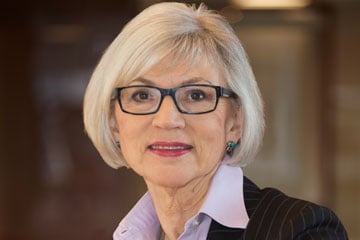
Beverley McLachlin says post-pandemic world must address inequity against women, other groups

COVID-19 has not only shown how destructive a global pandemic can be to the health of people and the economy, but it has also become “the great revealer” of many of the societal injustices that we must overcome, says former Supreme Court of Canada Chief Justice Beverley McLachlin.
“The pandemic has many faces, and the faces that come to mind first are the faces of illness and lives lost,” McLachlin told the more than 400 people who attended Canadian Lawyer’s Women in Law conference on Thursday.
“But the pandemic has other faces that shine a bright light on broad society and all its institutions and how it treats people,” she said in her address. “One of the faces I call the great revealer. The pandemic has taken situations that we assumed were fine, if we [also] admitted benignly flawed and we were valiantly working to make improvements.”
However, McLachlin said, the pandemic has revealed “fault lines” in our institutions and social structures and has forced us to recognize the injustices and inequities that had “previously been hidden by our complacency.
“It has shown us we can’t ignore these problems anymore, because small problems can become big problems,” producing even more injustices and inequities.
McLachlin added that that the pandemic will most certainly change how we do things, from managing medical emergencies and long-term care to how we handle the courts and the legal system. “The way lawyers practice will be different when we leave this, and [we must] recognize that we need to make improvements so that we do better than we have done before.”
The pandemic has also revealed much about the position of women in society. “COVID-19 has revealed the strength and indispensability of women to our survival,” she said. “At the same time, it has underlined starkly the inequitable treatment of those very women whose strength and energy has been called up so critically in dealing with the crisis we have faced.”
She noted that news stories have revealed that women “from the highest boardrooms to meatpacking plants” too often receive less pay than men doing equal work, and that “only a fraction of women compared to men climb the commercial ladder right to the top where the rewards are the greatest.” In the legal world, McLachlin pointed to stories that revealed female equity partners in a large national law firm in Canada are paid less than male equity partners.
McLachlin said that back in 1978, Rosalie Abella, now a Supreme Court of Canada Justice, headed up a royal commission on equality in employment “and delivered a powerful report on pay inequity.”
“I, like other young women at the time, read the report and dreamed of a world in which women would truly receive equal pay for equal work. Not just for fortunate women like me — I was a law professor, practitioner and judge, and was well rewarded — but for all women.”
However, McLachlin told those attending the virtual conference, “more than 40 years later, pay inequity is still with us.
"COVID-19 has underlined what we already knew, . . .that too often, women get paid less for the same work outside the home.” She added that women are often doing “double duty” caring for the family at home in many cases.
She said there are still those who defend pay inequity, though they tend to be more silent these days. But in private conversations, they will say it is “something we shouldn’t get too worried about,” and that it can be justified because often a women’s income is a second family income.
“But that idea is outmoded. The notion that women always have a better-paid male partner, that their jobs are somehow secondary, is just that, a notion belied by the actual lives of a vast swath of women.”
McLachlin concluded her address by saying the persistence of pay inequity is “morally unsustainable,” and that equal pay for equal work, or work of equal value, is a “basic tenant of human dignity.”
COVID-19 has revealed the vital importance of women to society, McLachlin said, but it also revealed the inequities that too often still beset the lives of many women.
“When the pandemic is over, we must not go back to the old status quo, we must build a workplace in which women are truly in every way, held to be worth as much as men.”